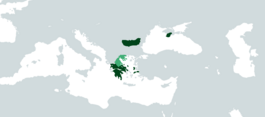Federal Republic of Rumelia
Federal Republic of Rumelia Ομοσπονδιακή Δημοκρατία της Ρωμυλίας Omospondiakí Dimokratía tis Romylía | |
|---|---|
|
Flag | |
| Motto: Ελευθερία ή θάνατος Eleftheria i thanatos "Freedom or Death" | |
| Anthem: O Thourios tou Riga | |
 Areas controlled by Rumelian-allied forces at some point during the war (dark green); areas where Rumelian-backed revolts were unsuccessful (light green) | |
| Capital | Tigani (de facto) |
| Largest city | Athens |
| Official languages | Greek Latin (de jure) |
| Recognised regional languages | Romanian |
| Religion | Greek Orthodox Church |
| Demonym(s) | Rumelian |
| Government | Confederal directorial provisional proto-state and military alliance |
• Consuls | Alexander Ypsilantis and Ahmed Karamanides (1821) Odysseas Androutsos, Michael Soutzos, Ahmed Karamanides, and others (1822-1823) Alexandros Mavrokordatos, Theodoros Negris, and Ahmed Karamanides (1823-1825) Alexandros Mavrokordatos and Theodoros Negris (1825-1827) |
| Legislature | Various |
The Federal Republic of Rumelia (Greek: Ομοσπονδιακή Δημοκρατία της Ρωμυλίας, romanised Omospondiakí Dimokratía tis Romylía), commonly known as Rumelia (Greek: Ρωμυλία, romanised Romylía) and often referred to as "Revolutionary Rumelia", was a proto-state and military allaince that existed for five years during the Greek War of Independence and the Wallachian Uprising, from 1822 to 1827. It effectively existed a loose confederation of various anti-Ottoman groups and states, such as the Danubian Principalities under the leadership of Tudor Vladimirescu and Prince Michael Soutzos, the Republic of Theodoro, led by Consul Ahmed Karamanides, the Military-Political System of Samos, led by Lykourgos Logothetis, and various Continental Greek and Peloponnesian revolutionary entities, eventually consolidated into the Provisional Administration of Greece.
Etymology
"Rumelia" derives from the term "Rûm", a Turkish form of "Rome", with the whole term meaning "Land of the Rûm (Romans)". Christians in the Ottoman Empire were often referred to as Rûm, and the areas where they lived as Rumelia, in reference to their Byzantine (Eastern Roman) heritage; hence, the term's usage by the revolutionaries represented them both as laying a claim to the Orthodox Christian heritage of Greece and Wallachia as well as to the legacy of the Roman and Byzantine empires, of which Theodoro considered itself to be an heir.
Member States
The member states of Rumelia, known variously as States, Polities, or Dioceses, varied throughout its history.
First Synkletos (1822)
- Republic of Theodoro
- Military-Political System of Samos
- Filiki Eteria (non-state)
- Principality of Wallachia (seceded 1823)
- Insular, Macedonian, Moldavian, and Thessalian revolutionaries (suppressed by 1823)
- Peloponnesian Senate (dissolved 1824)
- Areopagus of Eastern Continental Greece (dissolved 1824)
- Senate of Western Continental Greece (dissolved 1824)
Second Synkletos (1824)
Third Synkletos (1826)
- Republic of Theodoro
- Military-Political System of Samos
- Frangokastello revolutionaries (suppressed by 1827)
- Provisional Administration of Greece (seceded 1827)
